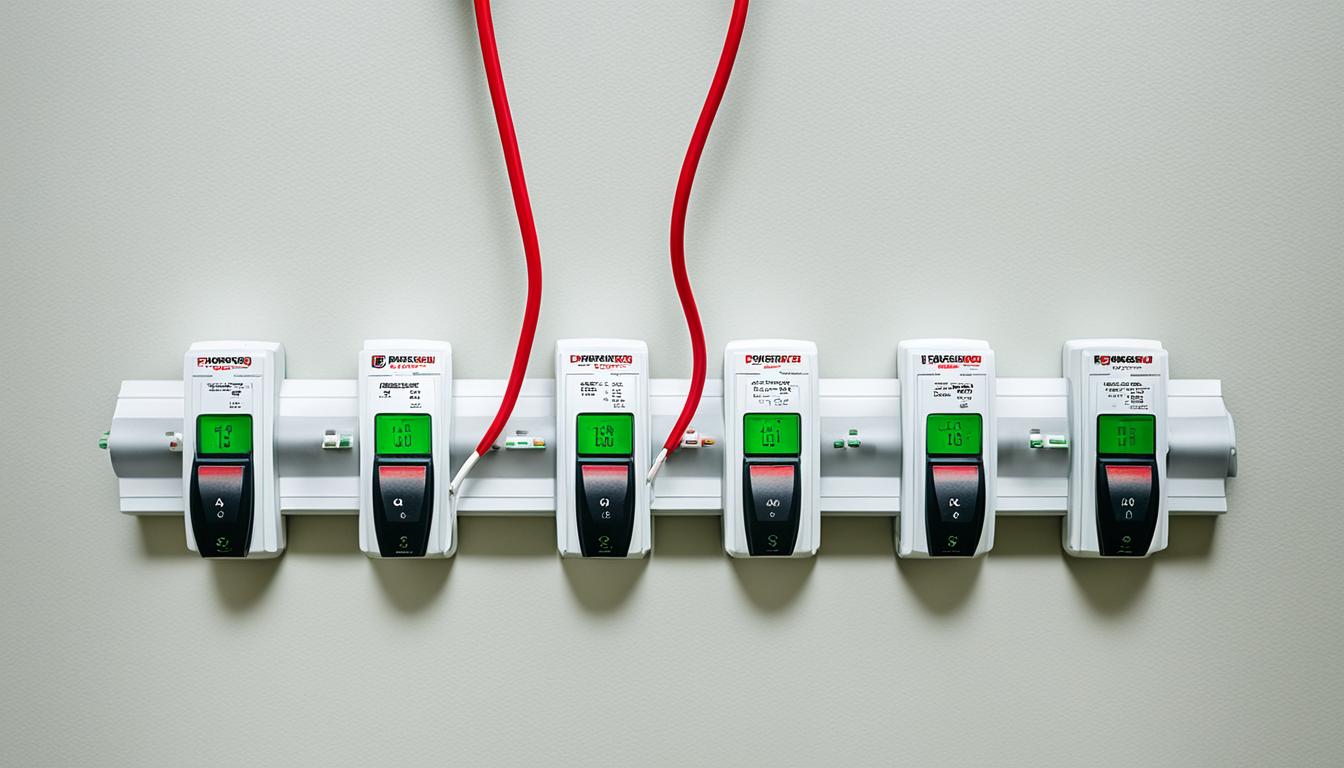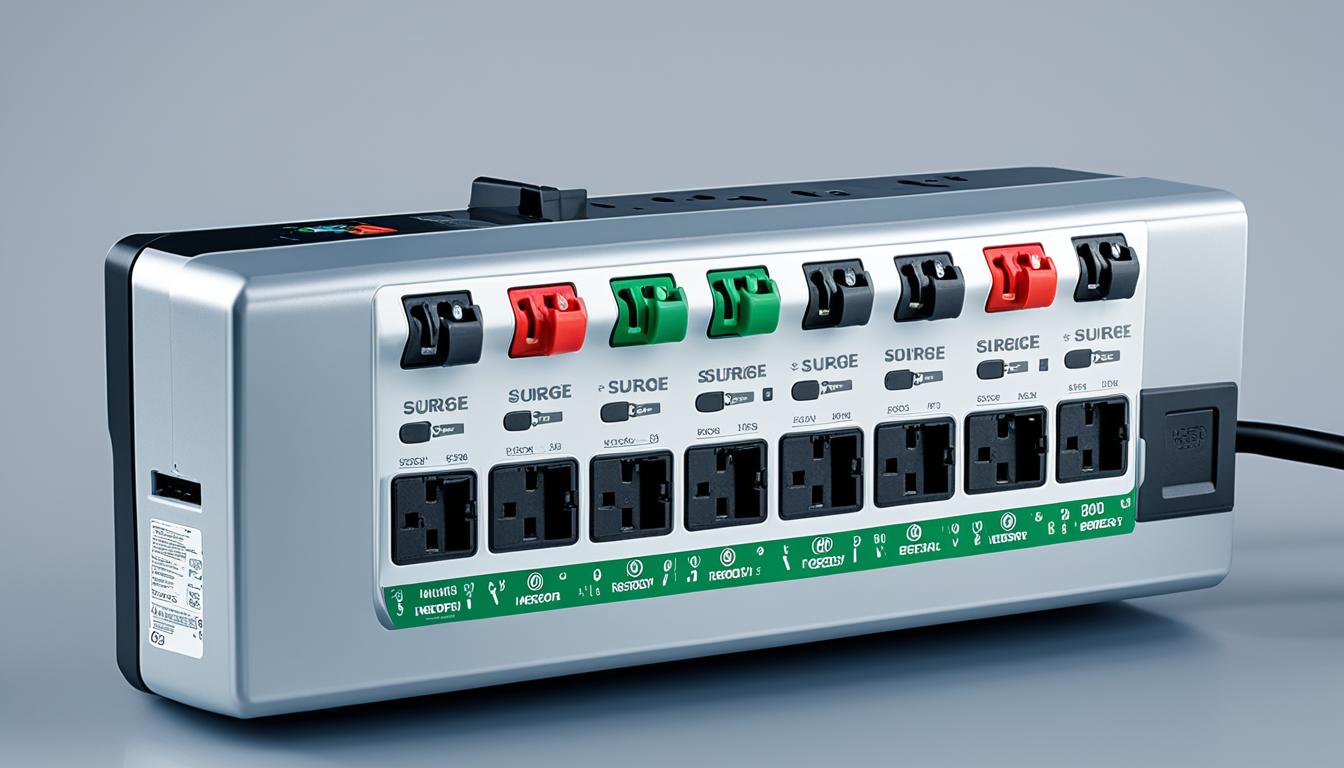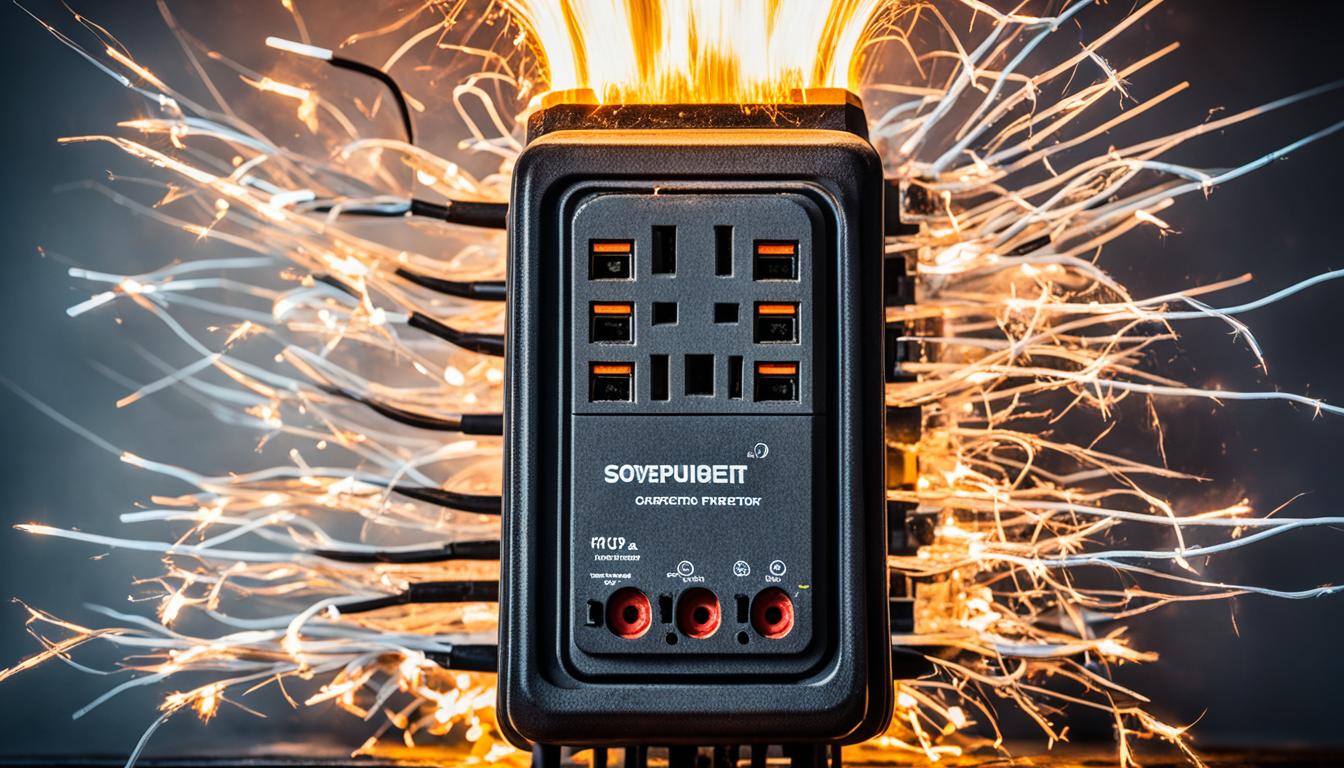extensioncords.site and its partners may earn a commission if you purchase a product through one of our links
It’s a convenient solution that many people consider, but can you plug a refrigerator into an extension cord? Before you do, it’s important to understand the potential risks and best practices involved. While it may seem like a simple solution, there are significant dangers that can arise from using an extension cord to power your refrigerator.
Key Takeaways
- Plugging a refrigerator into an extension cord can lead to overheating, voltage drop, and circuit overloading.
- Extension cords are not designed to handle the power needs of refrigerators, potentially resulting in damage or fire hazards.
- Follow best practices by plugging your refrigerator directly into a grounded outlet whenever possible.
- If using an extension cord is unavoidable, use a heavy-duty cord specifically designed for appliances.
- Always prioritize safety and adhere to the manufacturer’s guidelines for electrical connections.
Understanding the Risks of Plugging a Refrigerator Into an Extension Cord
Plugging a refrigerator into an extension cord can pose various risks. One major risk is overheating of the cord, as extension cords are typically not designed to handle the continuous power draw of a refrigerator. This can lead to damage or even fire hazards.
Another risk is voltage drop, especially if the extension cord is of insufficient gauge or too long. Voltage drop can impact the performance and lifespan of the refrigerator, causing inefficient cooling or premature component failure.
Additionally, plugging multiple appliances into an extension cord can overload the circuit and pose a fire risk. It’s important to be aware of these risks and take necessary precautions.
Risks of Plugging a Refrigerator Into an Extension Cord
| Risks | Description |
|---|---|
| Overheating of the Cord | Extension cords are not designed to handle the power draw of a refrigerator, leading to potential damage or fire hazards. |
| Voltage Drop | Insufficient gauge or lengthy extension cords can result in voltage drop, affecting the refrigerator’s performance and lifespan. |
| Overloaded Circuit | Plugging multiple appliances into an extension cord can overload the circuit, increasing the risk of fire. |
It’s important to be mindful of these risks and prioritize safety when it comes to plugging your refrigerator into an extension cord.
Best Practices for Powering Your Refrigerator
To ensure the optimal performance and safety of your refrigerator, it’s best to follow certain best practices. Here are some key recommendations:
- Plug your refrigerator directly into a properly grounded outlet: Whenever possible, it is recommended to connect your refrigerator directly to an outlet that is designed to handle the electrical requirements for refrigerators. This eliminates the risks associated with using extension cords, such as overheating and overloading.
- Consider installing a new outlet closer to your refrigerator: If your refrigerator is far from an accessible outlet, it is worth considering having a qualified electrician install a new outlet closer to the appliance. This ensures a convenient and safe power source without the need for long extension cords.
- Use heavy-duty extension cords designed for appliances: In situations where using an extension cord is unavoidable, make sure to use a heavy-duty extension cord specifically designed for appliances. These cords are built to handle the electrical requirements of refrigerators and provide a safe power supply. Check the gauge and length of the cord to ensure it can handle the power load of your refrigerator.
- Refer to the manufacturer’s guidelines and recommendations: Always consult the manufacturer’s guidelines and recommendations regarding electrical connections for your specific refrigerator model. They provide valuable information on the suitable power cord and electrical requirements for optimal performance and safety.
- Maintain regular maintenance: Keep your refrigerator in top condition by performing regular maintenance tasks, such as cleaning the coils and checking the door seals. These simple actions help optimize performance, reduce energy consumption, and minimize the risk of overheating.
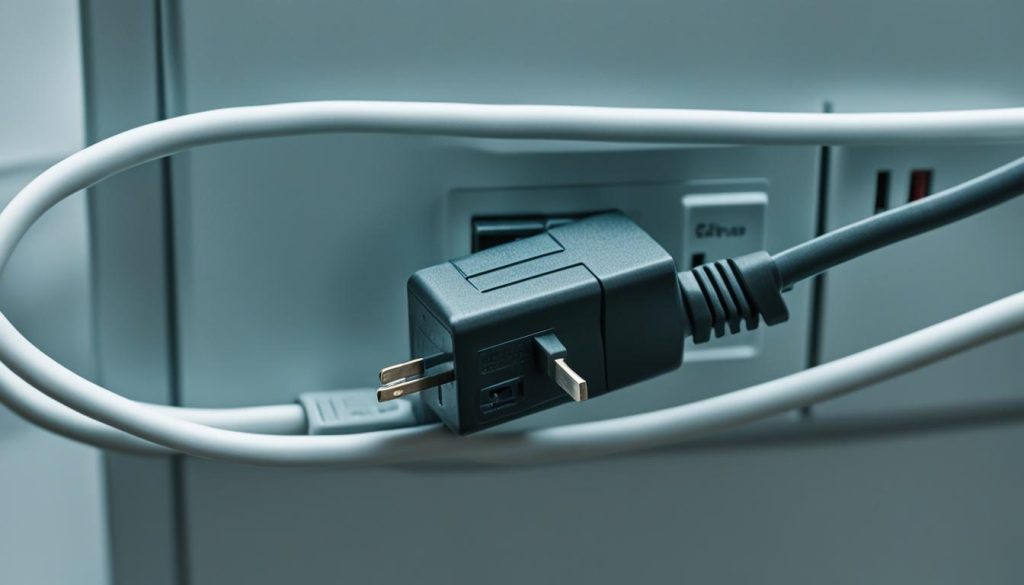
Following these best practices will not only ensure the efficient operation of your refrigerator but also help safeguard your home and prevent potential electrical hazards.
Why You Should Avoid Plugging Your Refrigerator Into an Extension Cord
When it comes to powering your refrigerator, it’s important to avoid using an extension cord as much as possible. There are several reasons why plugging your refrigerator into an extension cord is not recommended.
First, extension cords are not designed to handle the high wattage that refrigerators require. These cords are typically meant for smaller appliances and electronics, not heavy-duty appliances like refrigerators. Plugging your refrigerator into an extension cord can result in overheating, damage to the cord, and even fire hazards.
Second, extension cords are not intended for long-term use. Using an extension cord as a permanent solution for powering your refrigerator can lead to cord wear and the need for replacement. It’s best to prioritize safety and find alternative solutions.
Additionally, using an extension cord can add clutter to your home and create potential safety hazards. Extension cords can be tripping hazards, especially if they are not properly secured or placed in walkways. It’s important to minimize the use of extension cords and keep your living space organized and safe.
Instead of using an extension cord, it’s recommended to plug your refrigerator directly into a properly grounded outlet. This ensures a stable power supply and reduces the risk of electrical issues. If your refrigerator is far from an outlet, consider having a qualified electrician install a new outlet closer to the appliance.
By avoiding the use of extension cords, you can protect your refrigerator and your home from potential dangers. Prioritizing safety and following best practices for powering your refrigerator are essential for its optimal performance and longevity.
| Reasons to Avoid Plugging Your Refrigerator Into an Extension Cord | Alternatives to Using an Extension Cord |
|---|---|
| Extension cords are not designed for high-wattage appliances like refrigerators, leading to potential overheating and fire hazards. | Plug your refrigerator directly into a properly grounded outlet. |
| Extension cords are not intended for long-term use and can result in cord wear and replacement. | If necessary, have a qualified electrician install a new outlet closer to your refrigerator. |
| Using extension cords can add clutter to your home and create tripping hazards. | Keep your living space organized and minimize the use of extension cords. |
Factors to Consider When Choosing an Extension Cord for Your Refrigerator
If you find yourself in a situation where using an extension cord is unavoidable, there are some factors to consider when choosing one for your refrigerator.
- Cord Length: Ensure that the extension cord is long enough to reach from the outlet to the refrigerator with some extra length to spare. This will give you flexibility in positioning your refrigerator without straining the cord.
- Cord Gauge: Check the gauge of the extension cord. A higher gauge means that the cord is thicker and can handle more power. For powering a refrigerator, it’s recommended to use a cord with a lower gauge, such as 12 or 14, to ensure it can handle the electrical load effectively.
- Refrigerator Rating: Make sure that the extension cord is specifically rated for use with refrigerators. Using an extension cord that is only suitable for light-duty appliances may pose fire hazards and endanger the safety of your refrigerator and home.
By considering these factors, you can select an extension cord that is suitable for powering your refrigerator safely and efficiently.
If you are unsure about the appropriate extension cord for your specific refrigerator model, refer to the manufacturer’s guidelines or consult with a qualified electrician for expert advice.
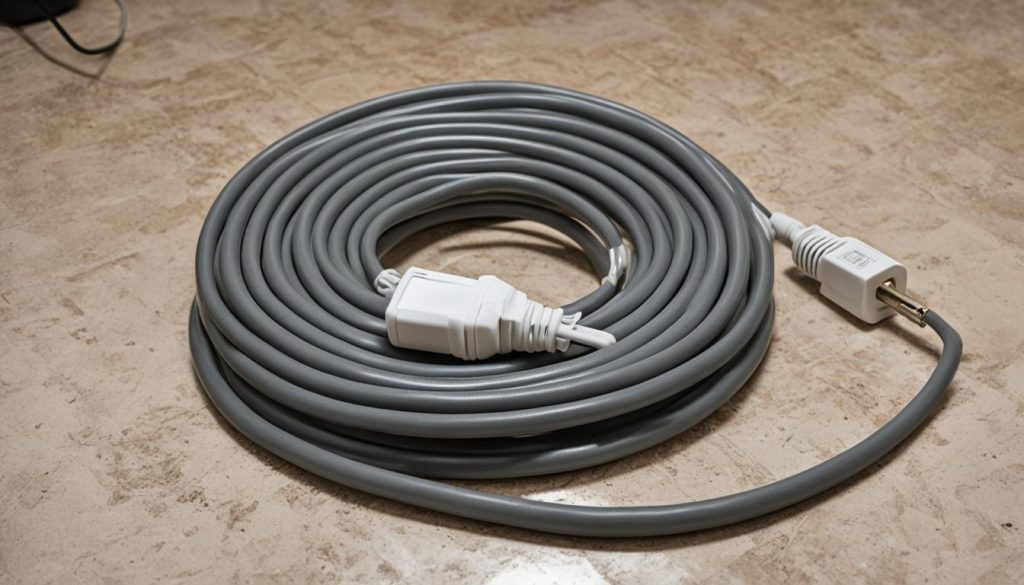
Plugging Multiple Appliances Into an Extension Cord: A Recipe for Disaster
“Using a single extension cord to power multiple appliances can lead to overloading the circuit and a potential fire hazard. Avoid this danger by distributing the load across different outlets or using dedicated circuits for power-hungry appliances like refrigerators.”
Another important consideration is the danger of plugging multiple appliances into a single extension cord. When multiple power-hungry devices are connected to the same cord, it increases the electrical load beyond its capacity. This can cause the cord to overheat and potentially result in a fire.
To mitigate this risk, it’s best to distribute the load across different outlets or use dedicated circuits for power-hungry appliances like refrigerators. This ensures that each appliance receives a stable and safe power supply, minimizing the chances of electrical overload and fire hazards.
The Dangers of Plugging Multiple Appliances Into an Extension Cord
When it comes to plugging multiple appliances into an extension cord, it’s important to be aware of the potential dangers and risks involved. One of the main concerns is the possibility of overloading the circuit, which can lead to overheating and even fire hazards.
When you connect multiple power-hungry devices to the same extension cord, it surpasses the cord’s electrical load capacity. This overload puts a strain on the cord, causing it to overheat and potentially ignite. To ensure the safety of your home and appliances, it’s crucial to avoid plugging multiple high-power devices, such as refrigerators, into a single extension cord.
Distributing the electrical load across different outlets or using dedicated circuits for power-hungry appliances is a better practice. By doing so, you can prevent overloading the circuit and minimize the risk of fire or equipment damage.
Remember, safety should always be a priority when it comes to electrical connections. It’s essential to follow manufacturer guidelines and recommendations and avoid taking unnecessary risks. Be mindful of the potential dangers associated with plugging multiple appliances into an extension cord and take the necessary steps to ensure a safe and reliable power supply for your devices.
| Dangers of Plugging Multiple Appliances Into an Extension Cord | Precautions to Take |
|---|---|
| 1. Overloading the circuit | Avoid plugging multiple high-power devices into a single extension cord. |
| 2. Overheating of the cord | Distribute the electrical load across different outlets or use dedicated circuits for power-hungry appliances. |
| 3. Fire hazards | Follow manufacturer guidelines and recommendations for electrical connections. |
The Importance of Following Manufacturer Guidelines
When it comes to powering your refrigerator, it is crucial to follow the guidelines and recommendations provided by the manufacturer. These guidelines offer specific instructions and precautions that ensure the safe operation of your appliance. Manufacturers have a deep understanding of the electrical requirements of their products and offer valuable insights on the appropriate power sources for your refrigerator.
By following the manufacturer’s guidelines, you can avoid potential risks and protect the longevity of your refrigerator. These guidelines are designed to prioritize safety and optimize the performance of your appliance, providing you with peace of mind.
One of the most important reasons for following the manufacturer’s recommendations is to ensure the safe operation of your refrigerator. Manufacturers have conducted extensive testing and research to determine the electrical specifications required for optimal performance. By adhering to their guidelines, you can prevent potential issues and the associated risks.
Additionally, manufacturers provide instructions on the suitable power sources for your refrigerator. This information is essential as it helps you avoid using inadequate power supplies that may not meet the requirements of your appliance. By using the right power source, you can avoid any potential damage to your refrigerator and maintain its operational efficiency.
| Benefits of Following Manufacturer Guidelines |
|---|
| Ensures the safe operation of your refrigerator |
| Prevents potential issues and risks |
| Helps you avoid using inadequate power supplies |
| Maintains the operational efficiency of your appliance |
By trusting the expertise of the manufacturer and adhering to their guidelines, you can protect your refrigerator and home from potential hazards. Following these recommendations is a simple yet effective way to safeguard your investment and ensure the optimal performance of your appliance for years to come.
Final Thoughts on Plugging a Refrigerator Into an Extension Cord
In conclusion, it is not recommended to plug your refrigerator into an extension cord due to the potential risks involved. Extension cords are simply not designed to handle the high-power demands of refrigerators, which can lead to fire hazards or cause your appliance to malfunction. To ensure the safety and optimal performance of your refrigerator, it is best to plug it directly into a properly grounded outlet.
If your refrigerator is located far from an accessible outlet, consider installing a new outlet closer to the appliance with the help of a qualified electrician. This solution eliminates the need for an extension cord and provides a stable power supply, minimizing the risks associated with using an extension cord.
By following best practices and adhering to manufacturer guidelines, you can prioritize the safety of your refrigerator. Regular maintenance, such as cleaning the coils and checking the door seals, also plays a vital role in its performance and reduces the risk of overheating. Remember, safety should always be your primary concern when it comes to powering your refrigerator.
FAQ
Can I plug a refrigerator into an extension cord?
While it may seem convenient, it is not recommended to plug a refrigerator into an extension cord due to the potential risks involved.
What are the risks of plugging a refrigerator into an extension cord?
Some risks include overheating of the cord, voltage drop that can affect the refrigerator’s performance, and overloading of the circuit.
What are the best practices for powering a refrigerator?
It is best to plug your refrigerator directly into a properly grounded outlet if possible. If an outlet is not accessible, consider installing a new one closer to the appliance. Use heavy-duty extension cords specifically designed for appliances when necessary and follow manufacturer guidelines.
Why should I avoid plugging my refrigerator into an extension cord?
Extension cords are not designed for high-wattage appliances like refrigerators and can pose fire hazards. Regularly using an extension cord to power your refrigerator can also lead to cord wear and the need for replacement.
What factors should I consider when choosing an extension cord for my refrigerator?
Consider the length of the cord, the gauge (thickness) of the cord, and whether it is rated for use with refrigerators. These factors will ensure the cord can handle the power load of the refrigerator and reduce fire hazards.
What are the dangers of plugging multiple appliances into an extension cord?
Plugging multiple appliances into a single extension cord can overload the circuit and pose a fire risk. It is best to distribute the load across different outlets or use dedicated circuits for power-hungry appliances.
Why is it important to follow manufacturer guidelines for powering my refrigerator?
Manufacturers provide specific instructions and precautions to ensure the safe operation of your appliance. Following these guidelines can help you avoid potential risks and protect your appliance and home.
Any final thoughts on plugging a refrigerator into an extension cord?
Prioritize safety, follow best practices, and consider alternative solutions to ensure the optimal performance and safety of your refrigerator. Always consult the manufacturer’s recommendations for electrical connections.
